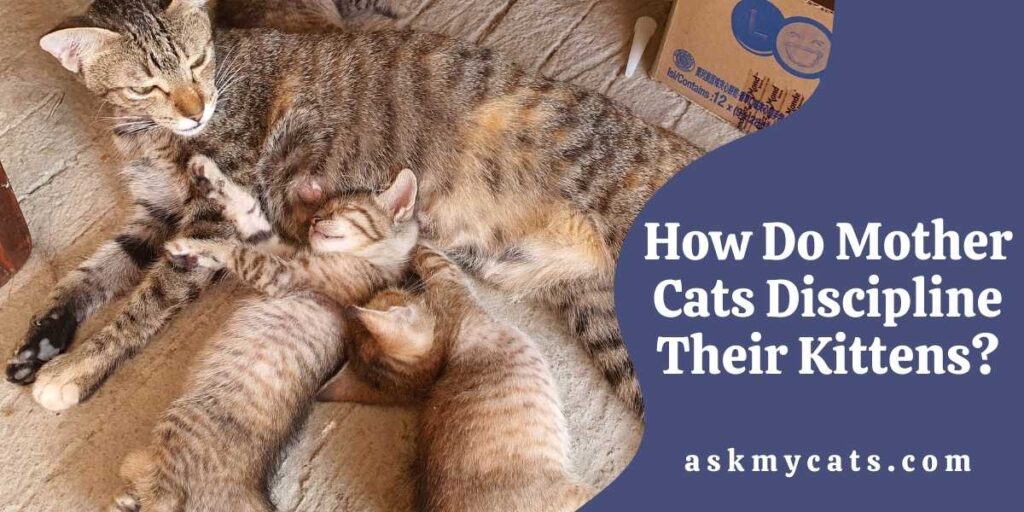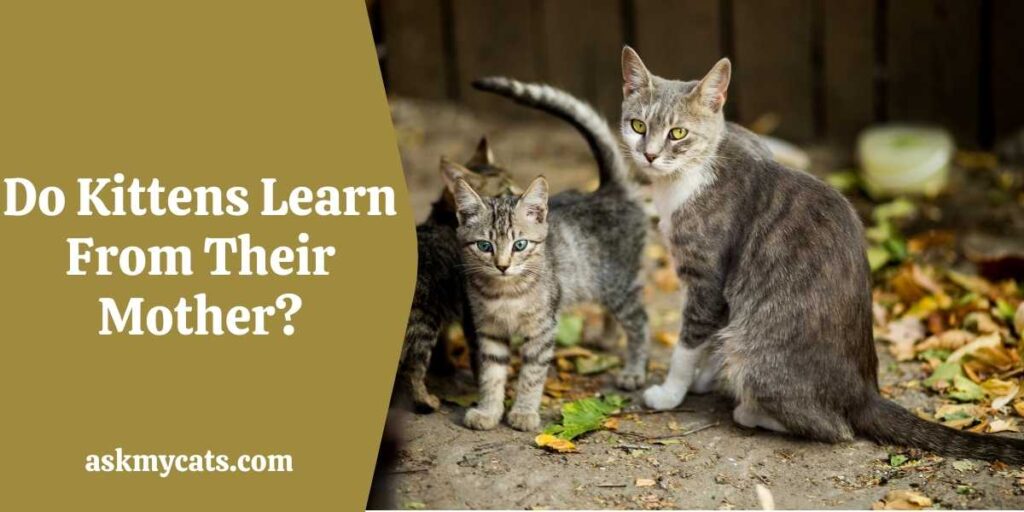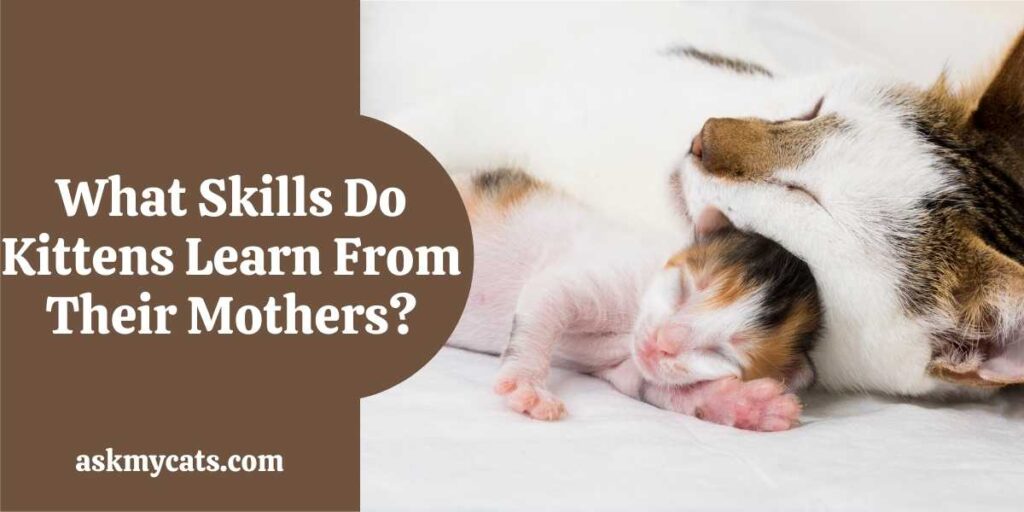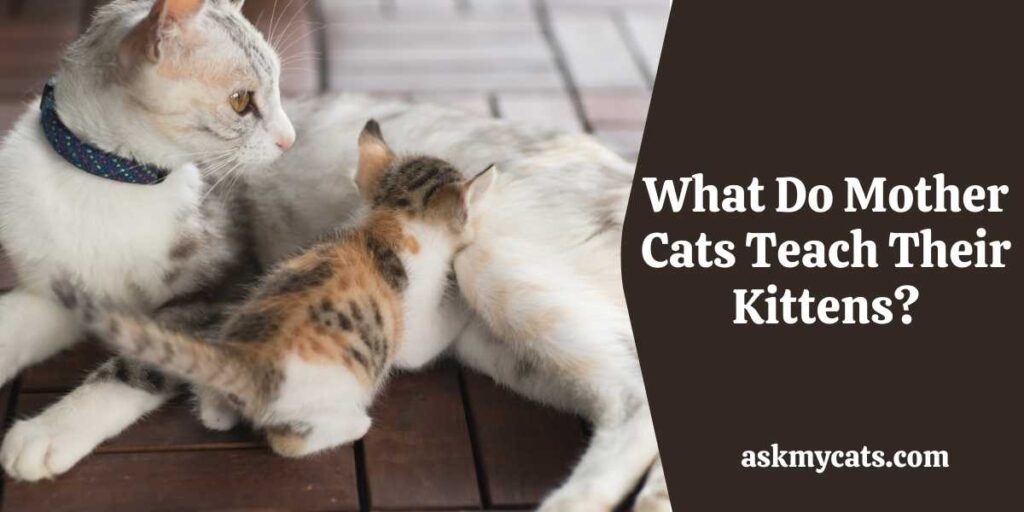Normal feline behavior and socialization include mother cats disciplining their young. Moms educate their kittens on how to socialize with other cats, play with their littermates properly, and what behaviors are unacceptable.
But how do they manage it?
Most mother cats, often known as queens, begin by removing misbehaving kittens from others. This provides a clear message to the kitten that they must do it on Mom’s terms if they want attention or play. If the kitten continues, the queen will increase the severity of the punishment by hissing at it or bopping it on the head.
Let’s take a closer look at how mother cats reprimand and punish their kittens.


Give Your Cat the Perfect Day
Get the Free Ebook!
Do Kittens Learn From Their Mother?
Yes, kittens learn discipline from their mother.

Because of the link and close interaction they share, kittens learn things faster from their mothers than from others. Before separation, kittens must learn basic things from their mother at an early age.
Mother cats also educate their kittens about self-care and self-defense.
As a result, the average age at which kittens are separated from their mothers is around 12 weeks.
Allowing kitten kitties to stay with their mother for longer lengths of time is important to us.
Let’s have a look at how moms educate their kittens on important skills.
Kittens should be allowed to stay with their mother for extended periods of time in order to acquire some basic habits. When young cats are educated by their mother, rather than by other adult cats, they are more likely to comprehend.
Before her kids are taken away from her, a mother cat teaches them various things.
These talents are necessary for the young cats’ survival in the absence of their mother. The lessons learned from a mother cat go a long way toward assisting kitten cats in maturing and growing.
What Skills Do Kittens Learn From Their Mothers?
Attention is one of the most effective teaching strategies for newborn kittens from their mothers.

Mother cats understand that they may not always be around to defend and safeguard their kittens.
Especially after separation, it’s critical to educate kids on how to be safe.
Kittens are generally unafraid to approach anybody or anything, despite the fact that they may be in danger.
While it may appear like socialization is a good idea, the mother cat normally educates them to be wary of strangers.
Mother cats educate their kittens on how to act in the presence of unusual dogs or cats. They teach kids how to defend themselves in case they need to flee in an emergency.
One of the most important characteristics of cats is their ability to seek for food. They are born with a hunting instinct.
Despite this, kittens still require instruction on how to hunt, which the mother cat provides. The kittens learn the fundamentals of hunting, such as where to look for their prey and how to approach it.
Their mother teaches them how to grab the prey without scaring it away with loud noises. The mother first teaches her child to hunt by presenting a dead mouse.
She then eats it to demonstrate that eating a mouse is healthy. After that, she lets them play with a dead mouse and eat with her.
When young cats are hungry, they typically consume everything they come upon. They will sometimes feed on their litter after peeing or defecating, which is unhealthy for them.
Another important thing that mother cats teach their kittens is how to eat. Apart from seeking food, kittens learn what to eat and what to avoid from their mother.
The mother cat instructs them on how to recognize food that is suitable for them to consume. When she approaches a certain sort of food, she expresses this by hissing or gnarling at her young.
Also, check out why do cats bring you their kittens
What Do Mother Cats Teach Their Kittens?
Mother cats teach their kittens a variety of things, including taking care of themselves, flourishing when they go out on their own, and providing food for them during their first few weeks of life.

Mother cats also educate their kittens on how to socialize and engage with other kittens.
Kittens learn how to interact and coexist with other cats before being separated from their mother. They also learn how to share space and avoid getting into mischief.
Cats are not the friendliest of animals, and they fight for territory dominance. They learn to adapt to their surroundings and socialize with other cats.
Mother cats show them how to hiss and gnarl appropriately. Being separated from their mother aids the young kittens in socializing and adjusting to their new surroundings.
Kitty cats are born with a set of razor-sharp teeth. They can injure themselves or other cats if they are not properly trained.
This is crucial because they require socialization and interaction with other young cats. Mother cats also teach their kittens how to control their behavior and set limits when playing.
Mother cats demonstrate how to use their claws and sharp fangs to protect their young. It’s critical to keep kids from harming themselves, especially when wrestling or playing.
When they need to defend themselves, they require sharp paws. As a result, the mother teaches them how to defend themselves using their claws.
Queen cats also teach their kittens how to clean themselves. At first, they observe and strive to imitate their mother while she grooms herself.
The mother cat shows them how to lick their paws, hair, and ears first. They get better at grooming themselves with time, especially after feeding.
Mother cats teach their kittens:
- Safety
- Hunting for food
- What to eat
- Toileting
- Interacting with others
- Self-limitation
How Does A Mama Cat Discipline Her Kittens?
Queen cats, sometimes known as mother cats, punish their kittens, but not in the typical sense.
They do so by inflicting a reaction on the wayward kitten, such as:
- Distancing themselves
- Hissing
- Vocalizing
- Hitting
- Biting
On the other hand, Cats do not regard these reactions as punishments but rather as remedial measures.
Discipline differs from correcting in that disciplining isn’t usually done right after the cat misbehaves, but correcting is. Disciplining also entails the removal of specific privileges, which is typical with human children but not with queens and kittens.
Cats cannot grasp punishment because they lack the cognitive capacity to distinguish between right and wrong. As a result, kittens are not taught lessons through punishment.
Correction does not always imply punishment but instead altering the kitten’s behavior to get it to perform what it’s intended to do. Mother cats do this by inflicting an adverse reaction on the misbehaving kitten, which directs the kitten’s activities so that it learns acceptable behavior.
How Do Mother Cats Teach Their Kittens?
Mother cats deny their kittens the attention they want by separating themselves from them. This educates the kitten on what is and isn’t appropriate behavior.
Another important skill that kittens must learn from their mother is how to communicate with other cats and people. It may be taught in two ways, both of which are crucial. One is a direct connection between kittens and their mothers.
It’s how they approach their mother and how she reacts, how she permits or disallows feeding, and how she intervenes if their cries for attention become too loud.
Kittens are incredibly excellent observers, and if their mother interacts effectively with the owners and other pets, kittens will take it as usual and will be simpler to handle.
Self-grooming is one of the many duties young kittens learn from their mother. They study the queen’s grooming routine and strive to imitate it.
Of course, the first few attempts consist of simply licking their paws and sometimes slipping them behind their ears, after which newborn kittens believe the mission is completed.
However, as they gain experience, they will be able to do whole self-grooming sessions on their own.
How Do Mother Cats Teach Kittens Not to Bite?
Mother cats do not explicitly educate their kittens not to bite since biting is an essential aspect of cat communication that can imply various things. However, they teach kittens to bite inhibition, or the capacity to control the power with which they bite.
Bite inhibition is crucial for kitten socialization because it teaches them how to play with other kittens without injuring them. If a kitten bites too hard when playing with its mother, the mother will tell it that it was not an appropriate degree of force.
By disengaging and ignoring the kitten, the mother cat may end playfulness. Other times, she may bite the kitten or vocalize her displeasure.
Over time, the cat learns which bites are appropriate during playing and will result at the end of playtime.
Allow the queen to teach the kitten bite inhibition instead of trying to educate it not to bite. Cats are easily anxious, so play fighting with bites is a suitable method for bonding with their playmates while also de-stressing.
You may have harmed its capacity to de-stress effectively by teaching it that biting is wrong, resulting in severe hostility.
Do Mother Cats Teach Their Kittens To Use The Litter Box?
Mother cats do not teach their kittens to use the litter box.
Kittens start digging in and using soil and dry, loose stuff as soon as they are a few weeks old, even though they have never seen their moms do it. Kittens are taught to use the litter box using this natural impulse.
Because of their inclination to release body waste in soil or sand, many cats and kittens will use a litter box without training. As a result, when a new kitten arrives, owners typically only need to explain to the kitten where the litter box is and how to go in and out.
Do Cats Scold Their Kittens?
Mother cats will use vocalizations like groaning or yowling to scold their kittens.
Researchers classify both noises as agonistic, and they are employed when a cat wishes to warn or threaten another cat.
Because hissing is a purely automatic behavior in cats, it cannot be termed a scolding tactic. Consider the following scenario: The scream you make when a child approaches you and scares you isn’t a scolding yell. The words that follow, on the other hand, are not.
Long, low-frequency cat moans frequently sound like the letters “u” or “o.” As they create this sound, their jaws will open and close. So, if you see a mother cat scolding her kittens, it’s because she’s scolding them.
A yowl is another vocalization used by cats to threaten another cat in a subdued manner. It’s a lengthy, drawn-out sound with different tones, lengths, and intensities.
When keeping their distance isn’t adequate, the mother cat will utilize vocalization to alert the kitten of its unacceptable behavior. Vocalization is a more successful strategy because it helps the kitten better relate its actions to the mother’s reply.
How Do Mother Cats Punish Kittens?
Mother cats punish their kittens’ poor conduct by withdrawing themselves from the environment, vocalizing, striking, and biting them.
If a kitten has problems grasping the lesson, the queen may increase the remedial measures. The most severe kind of punishment is biting.
Different disciplinary approaches ensure that the kitten learns what is suitable in interactions with its littermates and adult cats. Kitten socialization is critical; without it, cats would have a more challenging time dealing with stress and will indulge in more undesirable behavior.
Frequently Asked Questions
How do you discipline a kitten?
When your cat leaps onto appropriate surfaces, praise, and pet it while scolding and removing it from unacceptable places is a simple training strategy. The spray bottle can assist in teaching your kitty to avoid certain areas.
Does my cat trust me with her kittens?
Your cat continues to bring you her kittens because she wants them to become accustomed to you and familiarise themselves with your code of behavior. Your cat understands that she and her kittens will be living with you, so she wants them to get used to humans.
How do you discipline a kitten that doesn’t listen?
Screaming will agitate your cat, so avoid it. When it participates in undesirable conduct, reply “No.” Reward your cat with treats, a toy, or praise if it ceases the behavior when you ask. If your cat ignores you when you say “No,” try adding a tiny clap to the mix.
Final Words
Mother cats don’t constantly reprimand their kittens, preferring to modify their behavior subtly. The severity of the punishment is determined by the type of conduct and the number of times the kitten has misbehaved.
When it comes to correcting kittens, the timing of the correction is crucial. It is possible to raise well-socialized, happy cats by incorporating the timing and concepts of their mother’s corrections.
Ask your questions in the comments section below.
